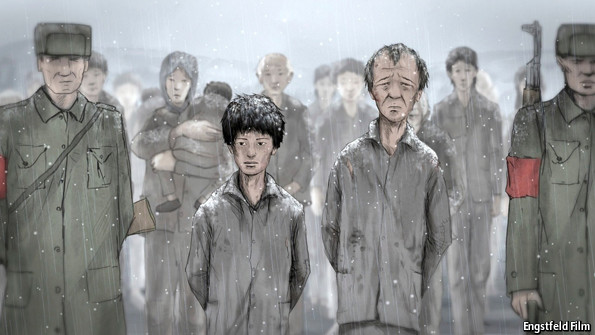
IN HIS memoir "If This is a Man", about his time as a prisoner in Auschwitz, Primo Levi ponders what it means to be human. What, he wonders, defines our humanity when we are robbed of physical and intellectual freedoms?
Yet Levi was able to remember what life felt like before the suffering of his internment. This was not a luxury afforded to Shin Dong Hyuk, who was born and raised in a North Korean "death-camp" for political prisoners until he escaped aged 23 to South Korea. He is now the subject of a new documentary called "Camp 14: Total Control Zone", directed by Marc Wiese, a German documentarian. It offers a rare and horrifying glimpse of the realities of daily life in a North Korean prison camp, where most inmates die of either starvation or public execution.
Interviews with Mr Shin, who was born to two prisoners forced to marry, reveal a broken man. His arms are deformed from beatings, his mind is fragile and he is besieged with nightmares. The subject of food comes up often; in the camps rations were limited to just 700g of corn a day. Indeed Mr Shin's escape was motivated not by the lofty promise of freedom but by another prisoner's tales of fancy food. We meet two chain-smoking former guards from other camps, also defectors and seemingly riddled with regret as they recall with sadness the atrocities they themselves committed. One, unbelievably, has footage of his camp, which he filmed secretly, revealing a stark landscape constrained by fences. Animated sequences drawn by Ali Soozandeh further evoke the horrors of prison life.
A particularly dark moment of the film is when Mr Shin recalls a family tragedy triggered by his own actions. Indoctrinated in an Orwellian ideology that promotes institutional loyalty over family obligations, Mr Shin grimly describes the event in which, as he says, "I had done my duty". Viewers may detect a note of regret—or just hope to.
Mr Shin is a fascinating subject, not only because of the morbid details he imparts, but because his story forces viewers to ask whether concepts such as family and liberty are innate or socially constructed. Does a man who has never known freedom long for it? And can he bear it when it arrives?

